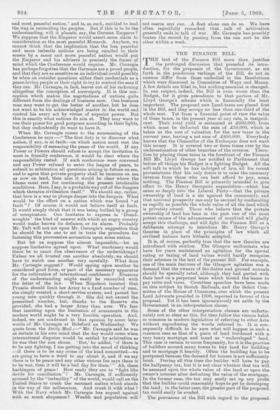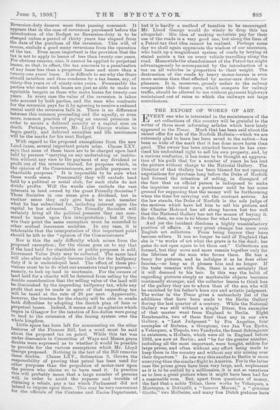• THE FINANCE BILL.
THE text of the Finance Bill more than , justifies the prolonged discussion that preceded its intro- duction, for the proposals of the Government, as set forth in the ponderous verbiage of the Bill, do not in essence differ from those embodied in the Resolutions. which were discussed in Committee of Ways and Means. A few details are filled in, but nothing essential is changed. In one respect, indeed, the Bill is even worse than the Budget, for it gives precedence to that portion of Mr. Lloyd George's scheme which is financially the least important. The proposed new Land-taxes are placed first • in the Bill, and they occupy no less than one-third of the whole text. Yet from a financial point of view the value of these taxes, in the present year at any rate, is insignifi- cant. Their total yield is estimated at £500,000, from which must be deducted the sum of X50,000,, which is taken as the cost of valuation for the new taxes in the current year, leaving a net sum of £450,000. Everybody knows that the Chancellor of the Exchequer does not want this money. It is covered two or three times over by the underestimation of other branches of the revenue. There- fore by placing these taxes in the forefront of the Finance Bill Mr. Lloyd George has notified to Parliament that before all things his Budget is a fighting Budget. All the soft talk in which he has indulged of ‘late, all his recent protestations that his only desire is to raise the necessary revenue from those who can beet afford to pay, mean , nothing. The Finance Bill is primarily intended to give, effect to .'the Henry Georgeite superstition—which has eaten so deeply into the Liberal Party—that the private ownership of land is a sin against the community, and that national prosperity can only be secured by confiscating as rapidly as possible the whole value of all the land which is privately owned. Those who believe that the private ownership of land. has been in the past one of the most potent causes of the advancement of mankind will gladly accept this challenge, and will fight the Finance Bill as a deliberate attempt to introduce Mr. Henry George's theories in place of the principles of law which all civilised nations have hitherto accepted.
It is, of course, perfectly true that the new theories are introduced with caution. The Glasgow enthusiasts who have for years maintained an agitation for the special rating or taxing of land values would hardly recognise, their schemes in the text of the present Bill. For example, one of the main features of the Glasgow agitation was a demand that the owners of feu-duties and ground annuals should be specially rated, although they had parted with their laud on a perpetual lease which bound the lessee to pay rates and taxes. Countless speeches have been made on this subject by Scotch Radicals, and the Select Corn- mittee of the House of Commons, over which the present Lord Advocate presided in 1906, reported in favour of this proposal. Yet it has been ignominiously set aside by the Government in an interpretation clause. .
Some of the other interpretation clauses are unfortu- nately not so clear as this, for they follow the vicious habit so common in modern legislation of referring to other Acts without reproducing the words referred to. It is con- sequently difficult to be sure what will happen in such a common case as that of a piece of land burdened with a very heavy mortgage and taxed as " undeveloped " laud. , This case is certain to occur frequently, for it is the practice of builders around many towns to buy land for building and to mortgage it heavily. Often the building has to be postponed because the demand for houses is not sufficiently brisk. During all this time the builder will have to pay the halfpenny tax, but it is not clear whether that tax will be assessed upon the whole value of . the laud or upon the owner's interest after deducting the value of the mortgage.. In the former case, the tax may easily eat up any profit , that the builder could reasonably hope to get by developing the land ; in the latter case, the greater part of the proposed tax ,could easily be evaded.
The provisions of the Bill with regard to the proposed Reversion-duty deserve more than passing comment. It appears that in the case of reversions purchased before the introduction of the Budget no Reversion-duty is to be charged unless a period of thirty years has elapsed from the date of the purchase of the reversion. This will, of course, exclude a good many reversions from the operation of the tax. Even more important is the provision that the tax is not to apply to leases of less than twenty-one years. For Obvious reasons, also, it cannot be applied to perpetual leases, so that, in effect, the tax amounts to a penalisation of any lease less than a perpetual lease and more than a twenty-one years' lease. It is difficult to see why the State should interfere and thus condemn by a tax leases, say, of thirty-five years or, of ninety-nine years. Presumably the parties who make such leases are just as able to make an equitable bargain as those who make leases for twenty-one years. In every case the value of the reversion is taken into account by both parties, and the man who contracts for the reversion pays for it by agreeing to receive a reduced rental until the reversion falls in. There is no difference between this common proceeding and the equally, or even more, common practice of paying an annual premium in order to secure a deferred annuity or a capital sum on death. Perhaps, however, Mr. Lloyd George wishes to begin gently, and deferred annuities and life assurances will be the marks for his next Budget.
With regard to the proposed exemptions from the new Lind-taxes, several important points arise. Clause XXV. says that none of these taxes are to be charged upon land held by persons "carrying on any undertaking or. institu- tion without any view to the payment of any dividend or profit out of the revenue thereof, for purposes which, in the opinion of the Commissioners, are public purposes or charitable purposes." It is impossible to be sure what these words mean. Presumably they will exclude land held by a political or social club, for such clubs do not divide profits. Will the words also exclude the vast interests in land owned by the great Friendly Societies ? These Societies in one sense give a dividend, but in another sense they only give back to each member whit be has subscribed for, including interest upon the capital he has advanced. The Friendly Societies will certainly bring all the political pressure they can com- mand to insist upon this interpretation • but if they win their point the same exemption must 1.)e conceded to other mutual insurance societies. In any case, it is intolerable that the interpretation of this important point should be left to the "opinion of the Commissioners.
Nor is this the only difficulty which arises from the proposed exemption; for the clause goes on to say that if the land held for charitable or public purposes is sold, Increment Value Duty may be collected. The same land will also after sale clearly become liable for the halfpenny duty if it is undeveloped land. The effect of these pro- visions must be to do what our ancestors tried to prevent,— namely, to lock up land in mortmain. For the owners of land held for a charity will be deterred from selling by the double consideration that the selling value of the land will be diminished by the impending halfpenny tax, while any profit that may be made in spite of that impending tax will be taxed at the rate of 20 per cent. Apparently, however, the trustees for the charity will be able to evade both difficulties by adopting the Scotch plan of bus or perpetual leases. Indeed, it seems as if an agitation which began in Glasgow for the taxation of feu-duties were going to lead to the extension of the feuiug system over the Whole kingdom. Little space has been left for commenting on the other features of the Finance Bill, but a word must be said about the proposed tax on petrol. While this tax was under discussion in Committee of Ways and Means grave doubts were expressed as to whether it would be possible to provide for the various exemptions which Mr. Lloyd George proposed. Nothing in the text of the Bill removes these doubts. Clause LXV., Subsection 3, throws the responsibility of proving that petrol has been used for other purposes than the propulsion of motor-cars upon the person who claims so to have used it. In practice this will probably mean that a large number of persons iu order to avoid the expense and trouble of claiming a rebate, pay a tax which Parliament did. not intend to impose upon them. This may be very convenient for the officials of the Customs and Excise Department, but it is hardly a method of taxation to be encouraged. Mr. Lloyd George would do wisely to drop this tax altogether. His idea of making motorists pay for their use of the roads is a very good one, but along the lines of a Petrol-tax that idea cannot be realised. Perhaps some day we shall again appreciate the wisdom of our ancestors, who built up a magnificent system of roads by levying at stated points a tax on every vehicle travelling along the road. Meanwhile the abandonment of the Petrol-tax might advantageously be accompanied by the introduction of a tax on all vehicles in proportion to their weight. The destruction of the roads by heavy motor-lorries is even more serious than that effected by motor-cars driven for pleasure. It is, moreover, grossly unfair to the railway companies that these cars, which compete for railway traffic, should be allowed to use without payment highways maintained out of rates to which the railways are large contributors.











































 Previous page
Previous page